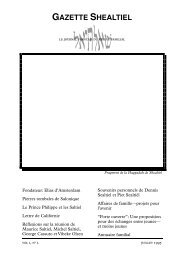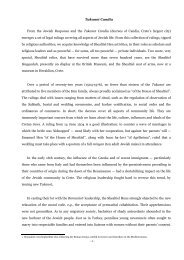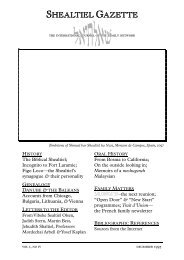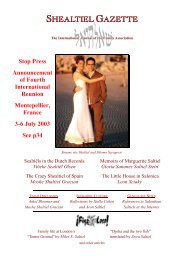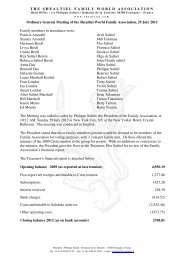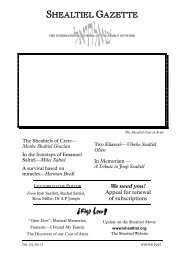The Cotopaxi Colony<strong>Satt</strong>’s account gives no reason for the credit stop, but the sequence of events that she offers makes it clear that it precipitatedthe crisis between Saltiel and the colonists. She confines her explanation to Saltiel’s perfidy, with no thirdpartyor documentary corroboration. We explore below how this follows the lead of the pioneers’ attorney, George HKohn, one of the authors of the January 1883 report to HEAS.Taking one thing with another, we have to attach greater weight to Schwarz’ sequence. This assessment derives fromthe contemporaneous character of Schwarz’ report and the involuntary evidence coming from a close reading, ratherthan its ostensible argument. By contrast, <strong>Satt</strong>’s sequence is reliant on the hearsay of three elderly women, who at thetime of the events they were describing were either unborn or minors, in an era in which women played little part inbusiness. Those alive at the time were unable to speak English and all came from households removed from the centreof events. Such first-hand recollections as they had would, moreover, have been contaminated <strong>by</strong> the refreshment offamily discussions during the following sixty-seven years.Let us examine what the sequence falling out of Schwarz’ document would have led to in New York and Colorado. Wemay take it that the Committee promptly penetrated Schwarz’ enthusiasms to dwell on his inconsistencies—four housesbuilt on p5 of his report vs eight on p11; financial imprecision—expenditures unbalanced with income and deficit unattributed(Schwarz, p15); and prolonged irrelevance—four pages out of eighteen devoted to erroneous comments on irrigation(Schwarz, pp6-10).The discrepancies in Schwarz’ report would have put the Committee on guard. Scant effort to detect the underlying conditionsinadvertently revealed <strong>by</strong> Schwarz’ report: no crops for immediate sale; no cash reserve plus mounting obligations;imperfect accommodation; and no provision to survive the winter. Neither Schwarz’ forensic skills nor his horticulturalshow-and-tell would see off the tough questioning to be expected, causing him to reveal the whole story includingthe colony’s uncovered obligations <strong>by</strong> way of store credit. Small wonder for the Society to become concerned thatSaltiel might hold them liable for the settlers’ debts. Their natural response would be to get him to stop further creditand ensure the colonists’ self-sufficiency for the winter, <strong>by</strong> earning a livelihood from the employment which Schwarzreports as readily to hand.Slightly parenthetically, following the debacle of Schwarz’ report we hear no more of him; <strong>Satt</strong> makes no mention ofhim after the summer and the subsequent dealings she reports were directly between the colonists and Saltiel. Presumablythe crisis following Schwarz’ report led him to be dismissed as General Manager.D—The legacy of bitternessIf this revisionist account of the colony is correct, we should give thought to the legacy of bitterness. A reasonablejudgement would be that it comes from seven sources: the accumulation of store credit; the clash of cultures between thecolonists and their new environment; the prevalence of conspiracy theories among Jewish refugees of the period; the conditionsof the winter of 1882-3; the negotiations of 1883; the distortions over time of oft-told tales; and the authority of <strong>Satt</strong>’s<strong>thesis</strong>.Store creditThe colonists were keenly aware of the debts they were accumulating (<strong>Satt</strong>, op cit, p14; Schwarz, p16). We are able to offerfour approximations. First there is the testimony of Schwarz who writes of $1544.87 of expenditure of food in the first fivemonths of the colony (Schwarz, p15). This takes us to 8 October, excludes non-food expenditure and is low <strong>by</strong> comparisonwith every other estimate. We may make a calculation from the 26 March 1884 edition of the Warsaw-based Hebrew newspaper,Ha-Melitz. This contains an account of the Jewish agricultural colony of Alliance, New Jersey, which failed in 1883.There, “the committee decided to allocate from $8 to $12 to each family, so they could live well and not sparingly” (Geffen,page 7 of 28 in reproduced article). We may take it that this was a weekly stipend. If applied to the 22 families reported <strong>by</strong><strong>Satt</strong>, this becomes $4,620 over the twenty-one weeks from 8 May to 1 October 1882 (<strong>Satt</strong>, p29).We reach higher figures if we attempt to work backwards from the earnings from the Denver and Rio Grande Railroad whichkept the colony in 1882 and 1883. These were between $2 and “up to $3” per day (Schwarz, op cit, p13; <strong>Satt</strong>, op cit, p26). Letus take the mean of $2.50 over a six-day working week for 21 men to reflect <strong>Satt</strong>’s “almost all” of the 23 adult males (That is,excluding Ed Grimes, who walked to Denver and Samuel Shradsky, “a very old man”, <strong>Satt</strong>, op cit, pp26, 29; Roberts, p130).Over the 21 week period, this totals $6,615. The highest figure comes from the 25 November 1885 issue of Ha-Melitz, which44
<strong>Flora</strong> <strong>Jane</strong> <strong>Satt</strong>—annotated <strong>by</strong> Miles Saltielwhich reprinted a letter to Elijah Sholman <strong>by</strong> Mordecai Jalomstein, an American journalist who frequently served as a correspondentto the newspaper. Jalomstein wrote that after his “intensive study” of “the reports which [had] reached him”, hehad learned that the Cotopaxi colony had “eaten up twenty thousand dollars.” If we subtract HEAS’ original budget of$10,000 and the October 1883 settlement of $2,000, we are left with other expenditures, presumably on store credit, of$8,000. The table below summarises the expenditures arising under these alternative assumptions.Scenarios1 2 3 4 NotesTravel from New York toColorado 1,250 1,250 1,250 1,250Infrastructure at Cotopaxi 8,750 8,750 8,750 8,750Final settlement with colonists 2,000 2,000 2,000 2,000Estimates of store creditScenario 1 1,555 1Scenario 2 4,620 2Scenario 3 6,615 3Scenario 4 8,000 4Total 13,555 16,620 18,615 20,000Notes1. Figures from Schwarz (p15).2. Based on weekly family stipend at the Vineland NJ colony, Geffen, Page 7 of 283. Based on the earnings of 21 adult males from the Denver and Rio Grande R/R; Schwarz, p13; <strong>Satt</strong>,, p26.4 Deduction from total cited <strong>by</strong> Jalomsten; Geffen, p. 24 of 28.This gives an estimating range (in round figures) between $1,500 and $8,000 for store credit, centring around $5,500; andtotal obligations (also in round figures) of between $13,500 and $20,000, centring around $17,500. Sums of this kind wouldbe bound to add to the anxieties of the colonists.Clash of culturesWe should also recognize how much the pioneers were at odds with their physical and cultural environment. They fell foul oftheir neighbours, who grabbed the best land (Roberts, p127) and whose cattle trespassed upon and ate their crops (Schwarz,p11; Roberts, p127; <strong>Satt</strong>, pp20, 24, 25), not to say whatever further depredations HS Henry was hinting at in his Februaryletter (RMJHN, p6). The settlers lacked familiarity with stock—the ox-team lost on arrival (Gulliford, para 5); the roamingcattle of the Wet Mountain valley or game—the bears preparing for hibernation (Schwarz, p11; Roberts, p127; <strong>Satt</strong>,p20); as well as the wherewithal to see off such threats as might be posed <strong>by</strong> begging tribesmen (<strong>Satt</strong>, p25). We detecttheir distance from local mores in the attitude of the Rocky Mountain News which responded to the stories of the difficultiesat Cotopaxi <strong>by</strong> noting that “all pioneers must endure some hardship” (<strong>Satt</strong>, p27). The cultural clash extended to the colonists’coreligionists. It is a commonplace of immigration that new arrivals have to contend with the suspicion of their predecessors.Russian Jews certainly ran into this, with, for example, H S Henry making no secret of his impatience (RMHJN, p6). Norshould we lose sight of the distance between the rugged individualism characteristic of America—in particular the frontier—of the period, and the priority attaching to alms as a mitzvah, blessing, among traditional Jews.Conspiracy theoriesIt is another commonplace that those feeling themselves powerless are prone to conspiracy theories. We find a contemporaneousexample in the lamentation of an anonymous colonist from Winnipeg. He wrote a letter, published in Ha-Melitz onJuly 27 1882, the first summer of Cotopaxi.“Like an outcast, I sit looking towards the sky and I hear voices of [my fellow-colonists] weeping…‘Look how we were deceived <strong>by</strong>the people we trusted and who seemed to be concerned with our welfare. They have sent us to a desolate place as servants andmaids to work for nothing for the local inhabitants…Why did they deceive us? Like sheep without a shepherd…we are bruisedfrom top to bottom.’ ” (Geffen, op cit, pp22-24 of 28 in reproduced document).If we hope that this unfortunate found his feet before the Manitoba winter set in, we need not take his bereft tone fullyto heart: those familiar with the Jewish literature of the period will recognize hyperbole of this kind as nothing out ofthe ordinary. His tone anticipates the heartfelt remonstrances recalled <strong>by</strong> B Prezant and similar sentiments handeddown to us <strong>by</strong> the descendants of the Cotopaxi pioneers, which later writers—unfamiliar with the conventions of largerthan-lifeidiom—took at face value.45



